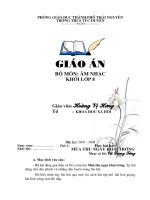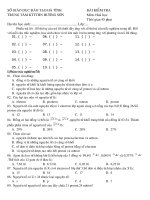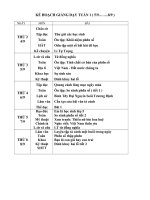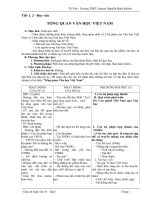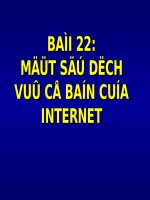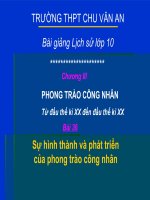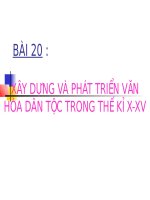bai giang lop 10 - U7 - 1
Bạn đang xem bản rút gọn của tài liệu. Xem và tải ngay bản đầy đủ của tài liệu tại đây (230.49 KB, 7 trang )
UNIT 7: THE MASS MEDIA
READING
Vocabulary.
- channel (n): - portrait (n)
- morning exercise: portrait of life:
- population (n) - documentary
- development (n) - TV series:
- comedy (n) - punishment (n):
- comment (n , v): - News Headlines:
- Weather Forecast: - quiz (n):
- drama (n): - wildlife world:
Task 1 : Match the words in A with their definitions in B.
1. cartoon
…………………………………………………………………………………………
2. drama
…………………………………………………………………………………………..
3. comedy
…………………………………………………………………………………………
4. documentary
……………………………………………………………………………………
Task 2 : Decide whether the statements are True (T) or False (F).
1. There are five news programmes on the three channels.
…………………………….
2. There is a comedy programme on between 10:15 and 11:00.
…………………………….
3. The Natural of Language is a documentary programme at
…………………………….
15:15 on VTV2.
4. The film Punishment is shown at 4:15 p.m on VTV1.
…………………………….
5. VTV1 starts at 5:35 and ends 23:30.
…………………………….
Task 3 : Answer the questions.
1. How many films are on? What are they? ………………………………………………………..
………………………………………………………………………………………………………
………………………………………………………………………………………………………
2. What time can you watch the news? …………………………………………………………….
………………………………………………………………………………………………………
3. Which channel do you recommend to someone who likes animals? ……………………………
………………………………………………………………………………………………………
4. What programme is on on VTV3 at 7:30? ………………………………………………………
………………………………………………………………………………………………………
5. Which channel will you watch if you like folk songs? ………………………………………….
………………………………………………………………………………………………………
6. What is the last programme on VTV3? …………………………………………………………
………………………………………………………………………………………………………
UNIT 7: THE MASS MEDIA
SPEAKING
Vocabulary.
- orally (through mouth): - aurally (through ears):
- visually (through eyes) - (to) present:
- (to) provide: - (to) get:
- feature (n): - distinctive (adj):
Task 1 : Which of the followings are the types of the mass media? Put a tick (
) next to
the words.
dictionaries books newspapers television magazines
plays films radio the Internet
Task 2 : Work out what feature(s) the types of the mass media have in common and what
main feature(s) each of them has.
………………………………………………………………………………………………………
………………………………………………………………………………………………………
………………………………………………………………………………………………………
………………………………………………………………………………………………………
………………………………………………………………………………………………………
………………………………………………………………………………………………………
………………………………………………………………………………………………………
………………………………………………………………………………………………………
………………………………………………………………………………………………………
………………………………………………………………………………………………………
………………………………………………………………………………………………………
Task 3 : Talk about different types of the mass media. Answer the following quations.
1. What are different types the mass media? ………………………………………………………
………………………………………………………………………………………………………
2. What feature(s) do they have in common? ………………………………………………………
……………………………………………………………………………………………………….
……………………………………………………………………………………………………….
3. What are their distinctive features? ……………………………………………………………..
……………………………………………………………………………………………………….
………………………………………………………………………………………………………
………………………………………………………………………………………………………
………………………………………………………………………………………………………
UNIT 7: THE MASS MEDIA
LISTENING
Vocabulary.
- healthy (adj): - (to) climb:
health (n): - (to) rise – rose - risen
- strong (adj): - flood (n):
- cloudy (adj): - (to) cause:
Task 1 : Listen to the radio news stories and tick the words you hear in the right column
under News story 1 and News story 2.
News story 1 News story 2
healthy
strong
young
cloudy
highest
wonderful
………………………………
………………………………
………………………………
………………………………
………………………………
………………………………
………………………………..
………………………………..
………………………………..
………………………………..
………………………………..
………………………………..
Task 2 : Listen to the radio news stories and fill in the missing word(s).
Heavy rain causes floods all over the country
Heavy rain during the night(1)………………………………….. all over the country today. Many
people(2)………………………………………….. because rivers (3)……………………………..
some roads in the north-west are under(4)……………………………..of water. The rain (5)
…………………………….. at the moment, but it’s still(6)……………………………….and
there’s a(7)…………………………….. because of the bad weather, people can’t go out to work.
90-year-old American woman climbs Mount Whitney
A nine-year-old woman has climbed, Mount Whitney in California for the (8)
…………………………time. At (9)……………………………metres, Mount Whitney is the
highest mountain in(10)………………………………. . The woman says the view from the top is
(11)……………………….., so she tries to climb it often. She also says that the mountain has kept
her(12)…………………………… . In spite of her old age, the woman tries to climb the mountain
very often.
Task 3 : Answer the questions.
1. What has happened during the night? ……………………………………………………………
……………………………………………………………………………………………………….
.
2. Why have people left their home? ……………………………………………………………….
……………………………………………………………………………………………………….
.
3. How many times has the old woman climbed Mount Whitney? ………………………………...
……………………………………………………………………………………………………….
.
4. Why does she climb it so often?
………………………………………………………………….
……………………………………………………………………………………………………….
.
UNIT 7: THE MASS MEDIA
WRITING
Vocabulary.
- advantage (n): - global (adj):
≠ disadvantage (n) - responsibility (n):
- memorable (adj): - brain (n)
- effective (adj): - (to) encourage:
- (to) entertain: - violent (adj):
- enjoyable (adj): - (to) interfere:
- (to) increase: - communication (n):
- popularity (n): (to) communicate:
- (to) be aware of
Task 1 : Read about the advantages and disadvantages of television.
Advantages of television Disadvantages of television
• Television helps us to
learn more about the world and to know and
see many new things.
• Television can make things
memorable because it presents information in
an effective way.
• It entertains us. Watching it
is an enjoyable way to relax.
• It increases the popularity
of sports and games.
• It makes us aware of our
global responsibilities.
• Television can make us
passive. We don’t have to think so our
brains become lazy.
• It encourages us to buy
things that we don’t need.
• It takes time away from
activities such as reading and games.
• Some television
programmes may make people violent.
• Television interferes with
family life and communication.
Task 2 : Discuss the advantages and disadvantages of the mass media, write them down in
the columns.
Advantages Disadvantages
Radio
…………………………………..
…………………………………..
…………………………………..
………………………………….
……………………………………..
……………………………………..
……………………………………..
……………………………………..
Newspapers …………………………………...
…………………………………...
…………………………………...
……………………………………..
…………………………………….
……………………………………..
…………………………………... ……………………………………..
The Internet
…………………………………...
…………………………………...
…………………………………...
…………………………………..
……………………………………..
……………………………………..
……………………………………..
……………………………………..
Task 3 : Write a paragraph about the advantages or disadvantages of one of the mass
media discussed in Task 2.
………………………………………………………………………………………………………
………………………………………………………………………………………………………
………………………………………………………………………………………………………
………………………………………………………………………………………………………
………………………………………………………………………………………………………
………………………………………………………………………………………………………
………………………………………………………………………………………………………
………………………………………………………………………………………………………
………………………………………………………………………………………………………
………………………………………………………………………………………………………
………………………………………………………………………………………………………
UNIT 7: THE MASS MEDIA
LANGUAGE FOCUS
I. PRONUNCIATION
/ ei / / ai / / /
……………………………………………………………………………………………………...
……………………………………………………………………………………………………...
……………………………………………………………………………………………………...
………………………………………………………………………………………………………
………………………………………………………………………………………………………
………………………………………………………………………………………………………
………………………………………………………………………………………………………
II. GRAMMAR
1. The Present Perfect.
(Unit 5 – Language Focus)
EXERCISE 1: Complete the letter, using the Present Perfect of the verbs in the box.
1. ………………………………….... 5. ……………………………………….
2. …………………………………… 6. ……………………………………….
3. …………………………………… 7. ………………………………………..
4. ……………………………………
EXERCISE 2: Complete the following sentences, usin “ for, since, or ago”.
1. …………………………………… 6. ……………………………………….
2. …………………………………… 7. ……………………………………….
